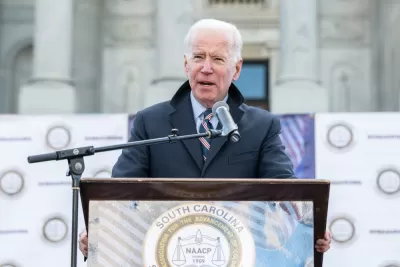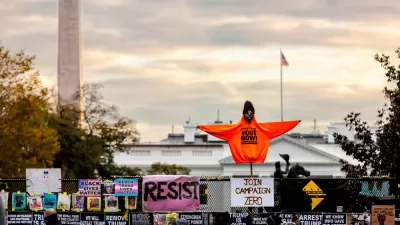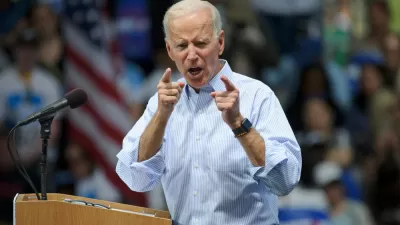Democratic presidential candidates made the housing crisis part of their platforms. What might a President Biden do to ease the shortage?

The attention paid by candidates to affordable housing this election cycle isn’t entirely surprising. The homelessness crises in America’s major cities are ongoing humanitarian disasters that have garnered national and even international attention. The price of housing in the U.S. has risen far faster than wages, leaving tens of millions of households burdened by their monthly rent.
“For a very long time, rent burdens and the housing problems that low-income people face have been part of a national advocacy effort,” says Noëlle Porter, director of government affairs at the National Housing Law Project (NHLP). “Now we’re at a place where your average American is rent burdened and that forces it to become part of ‘kitchen table’ conversations. At that moment it becomes an issue that candidates have to address.”
With no other candidates left in the primary race, Biden is now the presumptive Democratic nominee. He has proposed an ambitious housing platform to spend upward of $640 billion to increase federal funding for the construction and maintenance of public housing, and access to Housing Choice Vouchers and other rental assistance. His plan would also expand the Low Income Housing Tax Credit program, bolster the Fair Housing Act, and more.
If Biden wins and is able to implement his housing goals, it would mark a significant shift in how America tackles housing affordability. But with Democrats fairly unlikely to flip the Senate and Senate Republicans even less likely to sign on to sweeping affordable housing reforms, Biden would face a steep uphill battle for any idea that required Congressional approval.
So what could a future Democratic president accomplish on affordable housing if they can’t get their bills passed? Perhaps not enough to create paradigm shifts. But according to housing advocates and policy experts, the executive branch has a lot of leeway within administrative rulemaking to increase access to housing, protect vulnerable communities from discrimination, and potentially even increase housing supply.
For instance ...
FULL STORY: What Could a Joe Biden Presidency Accomplish on Affordable Housing?

Alabama: Trump Terminates Settlements for Black Communities Harmed By Raw Sewage
Trump deemed the landmark civil rights agreement “illegal DEI and environmental justice policy.”

Study: Maui’s Plan to Convert Vacation Rentals to Long-Term Housing Could Cause Nearly $1 Billion Economic Loss
The plan would reduce visitor accommodation by 25% resulting in 1,900 jobs lost.

Why Should We Subsidize Public Transportation?
Many public transit agencies face financial stress due to rising costs, declining fare revenue, and declining subsidies. Transit advocates must provide a strong business case for increasing public transit funding.

Paris Bike Boom Leads to Steep Drop in Air Pollution
The French city’s air quality has improved dramatically in the past 20 years, coinciding with a growth in cycling.

Why Housing Costs More to Build in California Than in Texas
Hard costs like labor and materials combined with ‘soft’ costs such as permitting make building in the San Francisco Bay Area almost three times as costly as in Texas cities.

San Diego County Sees a Rise in Urban Coyotes
San Diego County experiences a rise in urban coyotes, as sightings become prevalent throughout its urban neighbourhoods and surrounding areas.
Urban Design for Planners 1: Software Tools
This six-course series explores essential urban design concepts using open source software and equips planners with the tools they need to participate fully in the urban design process.
Planning for Universal Design
Learn the tools for implementing Universal Design in planning regulations.
Smith Gee Studio
Alamo Area Metropolitan Planning Organization
City of Santa Clarita
Institute for Housing and Urban Development Studies (IHS)
City of Grandview
Harvard GSD Executive Education
Toledo-Lucas County Plan Commissions
Salt Lake City
NYU Wagner Graduate School of Public Service





























